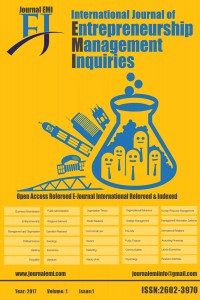Abstract
İnsan kaynağının etkin ve
verimli şekilde yönetilmesi, örgütlerde insan odaklı hale gelmesi stratejik
yönetim anlayışı ortaya çıkarmıştır. Hızla artan rekabet, hizmet odaklı
yaklaşımın yaygınlaşması insan odaklı stratejilerin geliştirilmesini
gerektirmektedir. Örgütlerde verimliliğin işgören performansının sağlanması
stratejik insan kaynakları yönetiminin önemini artırmaktadır. Özyeterlik,
iyimserlik, umut ve psikolojik dayanıklılığa sahip işgörenlerin örgüte temini
ve mevcut işgörenlerin bu özelliklere uygun şekilde geliştirilmesi stratejik
insan kaynakları ile mümkündür. Ahlaki değerleri benimsemiş, örgüt ilke ve
kültürüne uygun hareket eden etik liderler ile işgören arasındaki ilişkinin
doğru şekilde sağlanması, işgörenler arasındaki işbirliğinin sağlanması, yeni
fikirlerin üretilerek örgüte katma değer sağlamak amaçlarını ilke edinmiş bir
insan kaynakları stratejisi örgüt başarısında önemli rol oynar. Literatürde
hizmet inovasyon odaklı stratejik insan kaynakları yönetimi araştırmalarının
eksikliği nedeniyle, bu yönde araştırmaların yapılması önerilmektedir.
Keywords
Stratejik insan kaynakları yönetimi hizmet inovasyon davranışı psikolojik sermaye etik liderlik inovasyon
References
- Alsudiri, T., Al-Karaghouli,W., Eldabi, T. (2013). Alignment of large project management process to business strategy: A review and conceptual framework, Journal of Enterprise Information Management, 26 (5): 596-615, https://doi.org/10.1108/JEIM-07-2013-0050
- Amidon, D. (1997), Innovation Strategy for the Knowledge Economy. The Ken Awakening, Butterworth-Heineman, Newton, MA.
- Artto, K., Martinsuo, M., Dietrich, P.,Kujala, J. (2008). Project strategy: strategy types and their contents in innovation projects, International Journal of Managing Projects in Business, 1 (1): 49-70, https://doi.org/10.1108/17538370810846414
- Baker, D. (1999). Strategic human resource management: performance, alignment, management, Librarian Career Development, 7 (5): 51-63, https://doi.org/10.1108/09680819910276347.
- Bandura, A. (1986). Social foundations of thought and action: A social cognitive theory. Englewood Cliffs, NJ: Prentice-Hall. Bingöl, D. (2014). İnsan Kaynakları Yönetimi, Beta.
- Bouckenooghe, D., Zafar, A., Raja, U. (2015). How Ethical Leadership Shapes Employees’ Job Performance: The Mediating Roles of Goal Congruence and Psychological Capital, J Bus Ethics, 129: 251–264. Brown, M. E., Treviño, L. K., Harrison, D. A. (2005). Ethical leadership: a social learning perspective for construct development and testing. Organizational Behavior and Human Decision Processes, 97 (2): 117-134.
- Cheng, J-W., Chang, S-C., Kuo, J-H., Cheung, Y-H. (2014). Ethical leadership, work engagement, and voice behavior, Industrial Management & Data Systems, 114 (5): 817 – 831.
- Dhar,R. L. (2016). Ethical leadership and its impact on service innovative behavior: The role of LMX and job autonomy, 57, 139-148.
- Drucker, P. (1986), Innovation and Entrepreneurship, Perennial Library, New York, NY.
- Engelbrecht, J. Johnston, K. A., Hooper, V. (2017). The influence of business managers' IT competence IT project success, International Journal of Project Management 35: 994–1005
- Enz, C. A., Siguaw, J. A. (2003). Revisiting the best of the best: innovations in hotel practice. The Cornell Hotel and Restaurant Administration Quarterly, 44 (5-6), 115–123.
- Fadem, B. (2009). Behavioral Science, 5th Ed., Lippincott Williams and Wilkins, a Wolters Kluwer business, New York.
- Ferraz, I. N., Melo Santos, N. De (2016). The relationship between service innovation and performance: a bibliometric analysis and research agenda proposal, RAI Revista de Administração e Inovação, 13: 251–260.
- Hu, M.L.M., Horng, J.S., Sun, Y.H.C. (2009). Hospitality teams: knowledge sharing and service innovation performance Tourism Management, 30 (1), 41–50.
- Gallouj, F.,Savona, M. (2009). Innovation in services: A review of the debate and a research agenda. Journal of Evolutionary Economics, 19 (2), 149–172.
- Grant, R.M. (1991). The resource-based theory of competitive advantage: applications for strategy formulation, California Management Review, Spring: 114-35.
- Guest, D. (1992), Employee commitment and control, Hartley, J. and Stephenson, G. (Eds), Employment Relations içinde, Blackwell, Oxford: 111-35.
- Harris, D. H. (1994). Organizational Linkages: Understanding the Productivity Paradox, National Academies Press
- Kim, T. T., Karatepe, O. M., Lee, G. (2017). Psychological contract breach and service innovation behavior: psychological capital as a mediator, Serv Bus, https://doi.org/10.1007/s11628-017-0347-4.
- Luthans, F., Avolio, B. J., Avey, J. B., Norman, S. M. (2007). Positive psychological capital: Measurement and relationship with performance and satisfaction. Personnel Psychology, 60 (3): 541572.
- Matear, S., Gray, B. J., Garrett, T. (2004). Market orientation, brand investment new service development, market position and performance for service organizations. International Journal of Service Industry Management, 15 (3/4): 284–301.
- Nonaka, I. (1994). A dynamic theory of organizational knowledge creation, Organization Science, 5 (1): 14-37.
- Nonaka, I. (1996). “The knowledge-creation company”, Starkey, K. (Ed.), How Organisations Learn içinde, Thomson, London.
- Porter, M. E. (1985). Competitive Advantage: Creating and Sustaining Superior Performance, Simon and Schuster.
- Porter, M. E. (1986). Competition in Global Industries, Harvard Business Press.
- Porter, M. E., Teisberg, E. O. (2006). Redefining Health Care: Creating Value-based Competition on Results, Harvard Business Press.
- Salanova, M. Schaufeli, W.B. (2008). A cross-national study of work engagement as a mediator between job resources and proactive behaviour, The International Journal of Human Resource Management, 19 (1): 116-131.
- Schaufeli, W.B., Bakker, A.B. Salanova, M. (2006). The measurement of work engagement with a short questionnaire: a cross-national study, Educational and Psychological Measurement, 66 (4): 701-716.
- Scott, S. G., Bruce, R. A. (1994). Determinants of innovative behavior: a path model of individual innovation in the workplace. Academy of Management Journal, 37(3), 580–607.
- Storey, J. (1992). Developments on the Management of Human Resources, Blackwell, Oxford.
- Wiig, K. (1993). Knowledge Management Foundations – Thinking about Thinking – How people and Organizations Create, Represent and Use Knowledge, Schema Press, Arlington, VA.
Abstract
References
- Alsudiri, T., Al-Karaghouli,W., Eldabi, T. (2013). Alignment of large project management process to business strategy: A review and conceptual framework, Journal of Enterprise Information Management, 26 (5): 596-615, https://doi.org/10.1108/JEIM-07-2013-0050
- Amidon, D. (1997), Innovation Strategy for the Knowledge Economy. The Ken Awakening, Butterworth-Heineman, Newton, MA.
- Artto, K., Martinsuo, M., Dietrich, P.,Kujala, J. (2008). Project strategy: strategy types and their contents in innovation projects, International Journal of Managing Projects in Business, 1 (1): 49-70, https://doi.org/10.1108/17538370810846414
- Baker, D. (1999). Strategic human resource management: performance, alignment, management, Librarian Career Development, 7 (5): 51-63, https://doi.org/10.1108/09680819910276347.
- Bandura, A. (1986). Social foundations of thought and action: A social cognitive theory. Englewood Cliffs, NJ: Prentice-Hall. Bingöl, D. (2014). İnsan Kaynakları Yönetimi, Beta.
- Bouckenooghe, D., Zafar, A., Raja, U. (2015). How Ethical Leadership Shapes Employees’ Job Performance: The Mediating Roles of Goal Congruence and Psychological Capital, J Bus Ethics, 129: 251–264. Brown, M. E., Treviño, L. K., Harrison, D. A. (2005). Ethical leadership: a social learning perspective for construct development and testing. Organizational Behavior and Human Decision Processes, 97 (2): 117-134.
- Cheng, J-W., Chang, S-C., Kuo, J-H., Cheung, Y-H. (2014). Ethical leadership, work engagement, and voice behavior, Industrial Management & Data Systems, 114 (5): 817 – 831.
- Dhar,R. L. (2016). Ethical leadership and its impact on service innovative behavior: The role of LMX and job autonomy, 57, 139-148.
- Drucker, P. (1986), Innovation and Entrepreneurship, Perennial Library, New York, NY.
- Engelbrecht, J. Johnston, K. A., Hooper, V. (2017). The influence of business managers' IT competence IT project success, International Journal of Project Management 35: 994–1005
- Enz, C. A., Siguaw, J. A. (2003). Revisiting the best of the best: innovations in hotel practice. The Cornell Hotel and Restaurant Administration Quarterly, 44 (5-6), 115–123.
- Fadem, B. (2009). Behavioral Science, 5th Ed., Lippincott Williams and Wilkins, a Wolters Kluwer business, New York.
- Ferraz, I. N., Melo Santos, N. De (2016). The relationship between service innovation and performance: a bibliometric analysis and research agenda proposal, RAI Revista de Administração e Inovação, 13: 251–260.
- Hu, M.L.M., Horng, J.S., Sun, Y.H.C. (2009). Hospitality teams: knowledge sharing and service innovation performance Tourism Management, 30 (1), 41–50.
- Gallouj, F.,Savona, M. (2009). Innovation in services: A review of the debate and a research agenda. Journal of Evolutionary Economics, 19 (2), 149–172.
- Grant, R.M. (1991). The resource-based theory of competitive advantage: applications for strategy formulation, California Management Review, Spring: 114-35.
- Guest, D. (1992), Employee commitment and control, Hartley, J. and Stephenson, G. (Eds), Employment Relations içinde, Blackwell, Oxford: 111-35.
- Harris, D. H. (1994). Organizational Linkages: Understanding the Productivity Paradox, National Academies Press
- Kim, T. T., Karatepe, O. M., Lee, G. (2017). Psychological contract breach and service innovation behavior: psychological capital as a mediator, Serv Bus, https://doi.org/10.1007/s11628-017-0347-4.
- Luthans, F., Avolio, B. J., Avey, J. B., Norman, S. M. (2007). Positive psychological capital: Measurement and relationship with performance and satisfaction. Personnel Psychology, 60 (3): 541572.
- Matear, S., Gray, B. J., Garrett, T. (2004). Market orientation, brand investment new service development, market position and performance for service organizations. International Journal of Service Industry Management, 15 (3/4): 284–301.
- Nonaka, I. (1994). A dynamic theory of organizational knowledge creation, Organization Science, 5 (1): 14-37.
- Nonaka, I. (1996). “The knowledge-creation company”, Starkey, K. (Ed.), How Organisations Learn içinde, Thomson, London.
- Porter, M. E. (1985). Competitive Advantage: Creating and Sustaining Superior Performance, Simon and Schuster.
- Porter, M. E. (1986). Competition in Global Industries, Harvard Business Press.
- Porter, M. E., Teisberg, E. O. (2006). Redefining Health Care: Creating Value-based Competition on Results, Harvard Business Press.
- Salanova, M. Schaufeli, W.B. (2008). A cross-national study of work engagement as a mediator between job resources and proactive behaviour, The International Journal of Human Resource Management, 19 (1): 116-131.
- Schaufeli, W.B., Bakker, A.B. Salanova, M. (2006). The measurement of work engagement with a short questionnaire: a cross-national study, Educational and Psychological Measurement, 66 (4): 701-716.
- Scott, S. G., Bruce, R. A. (1994). Determinants of innovative behavior: a path model of individual innovation in the workplace. Academy of Management Journal, 37(3), 580–607.
- Storey, J. (1992). Developments on the Management of Human Resources, Blackwell, Oxford.
- Wiig, K. (1993). Knowledge Management Foundations – Thinking about Thinking – How people and Organizations Create, Represent and Use Knowledge, Schema Press, Arlington, VA.
Details
| Primary Language | English |
|---|---|
| Subjects | Economics |
| Journal Section | Articles |
| Authors | |
| Publication Date | December 26, 2017 |
| Submission Date | December 13, 2017 |
| Acceptance Date | December 20, 2017 |
| Published in Issue | Year 2017 Volume: 1 Issue: 1 |



Journal EMI e-mail Adresi: internationaljournalemi@gmail.com
JOURNAL EMI Creative Commons Attribution 4.0 Uluslararası Lisansı ile lisanslanmıştır.

